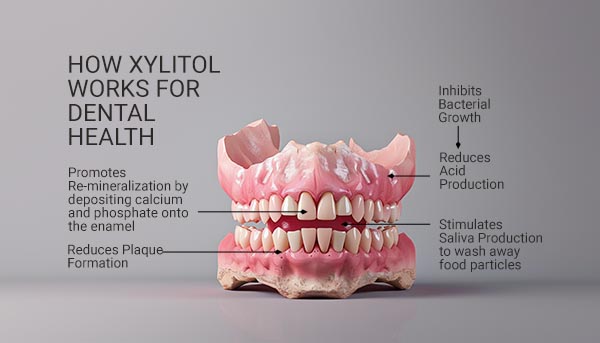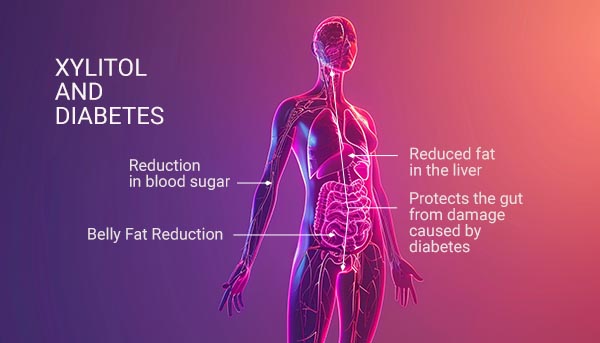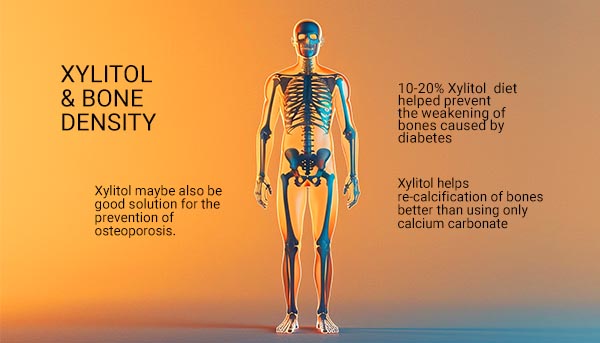I have had gum recession for years and it is getting bad. Turns out that chewing gum with Xylitol maybe a good solution. A deeper inspection of Xylitol has revealed that not only is it good for dental health but also diabetes and bone health. My teeth were looked after for over ten years at the UCLA school of dentistry in Los Angeles and not once did they mention Xylitol.
But in Europe particularly Finland and Sweden Xylitol forms part of an active program of dental health. In fact, EU-based legislation allows manufacturers to claim 100% xylitol chewing gum as effective in reducing dental plaque. In this Blog post it is claimed that the Finnish National Institute of Health & Welfare (2013) recommends that all 1 to 6 year children are given xylitol confectionery after meals to improve dental health and decrease the costs of public dental care.
WHAT IS XYLITOL
Xylitol is a sugar alcohol used as a sugar substitute. It occurs naturally in small amounts in various fruits and vegetables but is primarily produced from birch wood or corn. Xylitol has gained popularity as a sweetener in products like chewing gum, toothpaste, and sugar-free candies. Xylitol has no antibacterial properties of its own; rather, it appears to enhance the body’s own innate immunity.
It was first discovered almost simultaneously by Emil Fischer, a German chemist, in 1891, and by French chemist M. G. Bertrand. Finland started it using it during World War 2 as sugar substitute when the Finns discovered they could make Xylitol from birth trees. But it was only during the 1960’S that further studies revealed it’s dental benefits.
POTENTIAL BENEFITS OF XYLITOL
Dental Health: Xylitol has been shown to prevent tooth decay and cavities by inhibiting the growth of bacteria in the mouth, particularly Streptococcus mutans, which is a major contributor to dental plaque.
- Diabetes: Xylitol has a low glycemic index, which means it doesn’t cause a rapid spike in blood sugar levels. On the contrary it shows promising benefits for stabilizing blood sugar and healing the gut.
- Weight Management: Since Xylitol is lower in calories compared to sugar, it can be beneficial for individuals trying to manage their weight especially reducing for belly fat.
- Bone Health: Some studies suggest that xylitol may have positive effects on bone density and strength, potentially reducing the risk of osteoporosis.
- Ear Infections: Xylitol has been investigated for its potential to prevent middle ear infections (otitis media) in children. Some studies suggest that xylitol-containing products like chewing gum or syrup may help reduce the frequency of ear infections, although results are mixed.
HOW XYLITOL WORKS FOR DENTAL HEALTH
Xylitol’s benefits for dental health primarily stem from its ability to inhibit the growth of bacteria in the mouth, particularly Streptococcus mutans. Here’s a more detailed explanation of how xylitol helps promote dental health:
- Reduces Acid Production: When you consume sugary foods or carbohydrates, bacteria in your mouth feed on these sugars and produce acids as a byproduct. These acids can erode tooth enamel and lead to cavities. Xylitol, however, cannot be metabolized by oral bacteria in the same way as sugar. When bacteria consume xylitol, they are unable to ferment it efficiently, leading to a decrease in acid production. Xylitol inhibited the rate of acid production from glucose This Saudi Arabian study did an invitro study using xylitol infused chewing gum and found xylitol significantly affects pH (acidity) in the short term. However the study also found that most xylitol infused chewing gum had less than the suggested concentration required for the prevention of dental caries. The lesson is to get 100% xylitol.
- Inhibits Bacterial Growth: Xylitol disrupts the growth of Streptococcus mutans, a type of bacteria commonly found in the mouth. This bacteria is particularly problematic because it produces acids that contribute to tooth decay. By inhibiting the growth of these bacteria, xylitol helps maintain a healthier balance of oral flora and reduces the risk of cavities.
- Stimulates Saliva Production: Chewing gum or consuming products sweetened with xylitol stimulates saliva production. Saliva plays a crucial role in oral health by helping to wash away food particles and neutralize acids in the mouth. Increased saliva flow can help prevent dry mouth, which can contribute to dental issues like cavities and gum disease.
- Promotes Remineralization: Xylitol may also aid in the remineralization of tooth enamel. Remineralization is the process by which minerals such as calcium and phosphate are deposited back into the enamel, strengthening and repairing it. By reducing acidity in the mouth and promoting saliva flow, xylitol creates an environment that is more conducive to remineralization.
- Reduces Plaque Formation: Regular consumption of xylitol-containing products has been shown to reduce the formation of dental plaque. Plaque is a sticky film of bacteria that forms on the teeth and can lead to gum disease and tooth decay. By inhibiting plaque formation, xylitol helps maintain better overall oral hygiene.
THE EVIDENCE OF XYLITOL FOR DENTAL HEALTH
A) Cavity Prevention
One of the earliest studies investigating the effects of xylitol on dental health was conducted in Turku, Finland, in the 1970s. This study, known as the Turku Sugar Studies, compared the effects of xylitol-containing gum versus regular chewing gum on dental caries in children. The results of this study provided early evidence of the anti-cariogenic (cavity-preventing) properties of xylitol.
Since then, numerous studies have been conducted worldwide to further explore the efficacy of xylitol for dental health, including its ability to reduce plaque formation, inhibit the growth of cavity-causing bacteria, and prevent tooth decay.
B) Reduces Plaque Formation
This study found plaque formation decreased by 20-41% when Xylitol based chewing gum was used. Another study comparing Sorbital vs Xylitol clearly found Xylitol reduced plaque formation by 20.4% while Sorbitol; increased plaque. Perhaps it is best to avoid chewing gum with Sorbitol given those results. The finding of this study suggests that xylitol, when used as a mouth rinse, may decrease plaque formation and potentially reduce the levels of cariogenic bacteria in the mouth.
C) Remineralization
Remineralization serves as a built-in repair mechanism for your teeth. Essentially, your body harnesses calcium and phosphate minerals present in your saliva, then strategically deposits them into the enamel, the outer shield safeguarding your teeth. Conversely, demineralization occurs when minerals are leached from your enamel, a process that unfolds as you consume food and beverages during the day.
For years Fluoride has been the gold standard in reducing tooth decay. However, Fluoride has been controversial of recent due to various side effects such as Dental fluorosis (mostly in children) oral discomfort, rashes, itchiness and gastrointestinal issues.
This Japanese study on a test lab found indicate that xylitol can induce remineralization of deeper layers of demineralized enamel when immersed in demineralizing solution with 20% xylitol at 37 degrees C for 2 weeks.
This study looked at Xylitol varnishes efficacy of xylitol varnishes (presumably to make a commercial product) on the remineralization and found it able to significantly reduce the enamel lesion (enamel demineralization). So, while it did not exactly demineralize the tooth in the study, perhaps it could arrest enamel demineralization.
However this study found enamel surface remineralization was significantly increased by Duraphat™, 10% xylitol plus F and 20% xylitol plus F formulations, while significant subsurface mineral remineralization could be seen only for enamel treated with Duraphat™, Duofluorid™ and 20% xylitol formulations. Of course, the Colgate Duraphat has Fluoride that some may want to avoid so taking a gum with high quality xylitol might be a better option in this regard.
D) Gum recession
Research on the specific effects of xylitol on gum recession is limited, and there isn’t a significant body of evidence specifically examining xylitol’s efficacy in preventing or treating gum recession. Gum recession, also known as gingival recession, is a condition where the gums recede or pull away from the teeth, exposing the tooth roots.
However, xylitol’s broader benefits for oral health, including its ability to reduce plaque formation, inhibit bacterial growth, and promote saliva production, may indirectly contribute to gum health and potentially help prevent gum recession. Here’s how:
- Plaque Reduction: Xylitol has been shown to reduce plaque formation on teeth, which can contribute to gum disease. By decreasing plaque accumulation, xylitol may help prevent the inflammation and tissue damage associated with gum disease, including gum recession.
- Bacterial Inhibition: Xylitol inhibits the growth of cavity-causing bacteria, such as Streptococcus mutans, in the mouth. While gum recession is primarily caused by gum disease rather than dental caries, maintaining a healthier balance of oral bacteria may help prevent the progression of gum disease and subsequent recession.
- Saliva Stimulation: Xylitol stimulates saliva production, which plays a crucial role in oral health by helping to wash away food particles, neutralize acids, and maintain a moist environment in the mouth. Adequate saliva flow can contribute to gum health and may help prevent conditions like gum recession.
This Erskline Family dentistry blog post, they say Xylitol will help to make the harmful bacteria disappear and over time the pockets that you’ve developed in your gum line will heal and recede back to their normal condition with the use of at least ten grams of xylitol each day.
XYLITOL AND DIABETES
There is increasing evidence that Xylitol could be an effective tool for managing diabetes. This South African rat model study found xylitol a great a supplement to antidiabetic food. It found after 5 weeks of 10% xylitol was given to the rats, body weight, blood glucose, serum fructosamine and most of the serum lipids were significantly decreased, and serum insulin concentration and glucose tolerance ability was significantly increased.
This 8-week Japanese study on rats found xylitol could suppress postprandial (time immediately following a meal) rise in glucose and insulin levels. The rats eating xylitol also had less belly fat compared to the ones not eating it, even though they were all eating the same amount of food. Their blood sugar, insulin, and fats in their blood were also lower. Xylitol seemed to affect certain genes in their bodies that are involved in burning fat for energy. The study looked at their liver, we saw that the genes related to making fat were turned down, while the ones for burning fat were turned up.
This Chinese study published in 2024 found Xylitol seems to help protect the gut from damage caused by diabetes. The study also found Xylitol reduce food intake but didn’t change their weight much.
XYLITOL AND BONE DENSITY
This study from 1993 found that the supplementation of the diet with 5% xylitol had a protective effect against the loss of bone mineral after ovariectomy in the rat. The study used rats who were given an ovariectomy (surgery to remove one or both of the ovaries) because surgical ovariectomy drives rapid and prolonged bone loss. In that sense Xylitol maybe also be good solution for the prevention of osteoporosis.
This finish Study from the University of Turku found Xylitol increased the recalcification of bones better than using only CaCO3 (calcium carbonate) and suggests adding Xylitol to calcium supplements might be a good idea. That means Xylitol promotes the absorption of calcium into our bones leading to better bone health.
This rat model using diabetic rats, this time from the University of Oulu in Finland found xylitol protects against the weakening of bone strength and volume. It looked at how adding different amounts of xylitol to the diets of rats with diabetes affected their bones. They divided 40 male rats into four groups. Three groups got a chemical called streptozotocin to give them diabetes, while the fourth group got a harmless injection. Some rats were fed a regular diet, while others got the same diet with either 10% or 20% xylitol added. After three months, they examined the rats’ bones. They found that adding 10% or 20% xylitol to the diet helped prevent the weakening of bones caused by diabetes. The rats given xylitol had stronger bones, especially in the legs and shoulders, compared to those without xylitol. The xylitol also helped keep the bones dense and prevented loss of bone volume.
XYLITOL AND EAR INFECTIONS
Otitis media is an infection or inflammation of the middle ear, the space behind the eardrum. It’s a common condition, especially in children, but it can also affect adults. It is caused by three types of bacteria; Streptococcus pneumoniae, Haemophilus influenzae and Moraxella catarrhalis.
Xylitol inhibits the growth of Streptococcus pneumoniae and it inhibits the attachment of both pneumococci and Haemophilus influenzae on the nasopharyngeal cells. In two clinical trials xylitol was found efficient to prevent the development of acute otitis media with a daily dose of 8.4-10 g of xylitol given in five divided doses.
The efficacy in these 2-3 months follow-up trials was approximately 40% when chewing gum was used and approximately 30% with xylitol syrup. The need to use antimicrobials reduced markedly when using xylitol.
This study found that the Xylitol is NOT effective when combined with fructose in products intended to prevent acute otitis media. This because the study found the presence of fructose eliminated the ability of Xylitol to destroy Streptococcus pneumoniae. But Xylitol was able to eliminate Streptococcus pneumoniae when glucose, galactose, or sucrose was present.
SIDE EFFECTS OF XYLITOL
One thing is for sure. Xylitol is deadly for dogs and possibly other pets. For human xylitol is generally very safe according to this Healthline article. After all the Finnish government actively encourages school children to chew gum with xylitol. However xylitol still has some side effects:-
- Gastrointestinal Disturbances: Consuming large amounts of xylitol can cause gastrointestinal issues such as gas, bloating, abdominal pain, and diarrhea. These symptoms occur because xylitol is not fully absorbed in the digestive tract and can ferment in the colon, leading to osmotic effects and gas production.
- Hypoglycemia (Low Blood Sugar): Xylitol has a low glycemic index, meaning it does not cause a rapid increase in blood sugar levels. While this can be beneficial for individuals with diabetes, excessive consumption of xylitol can lead to hypoglycemia, especially in dogs. In humans, hypoglycemia due to xylitol consumption is rare but can occur in individuals with insulin resistance or those taking medications that lower blood sugar levels.
- Allergic Reactions: Although rare, some people may experience allergic reactions to xylitol, characterized by symptoms such as itching, swelling, hives, or difficulty breathing. Individuals with a known allergy to birch pollen may be at a higher risk of xylitol allergy.
- Laxative Effect: Xylitol can have a laxative effect, particularly when consumed in large quantities or by individuals who are not accustomed to it. This can lead to loose stools or diarrhea, especially in sensitive individuals.
- Danger to Pets: Xylitol is highly toxic to dogs and can cause a rapid release of insulin, leading to hypoglycemia, seizures, liver failure, and even death. Pet owners should be extremely cautious and ensure that xylitol-containing products are kept out of reach of dogs.
HOW MUCH XYLTOL FOR DEANTAL HEALTH
The recommended effective dose of xylitol is approximately 6–8 g per day. We found this article on news-medical which says a significant reduction of s.mutans in plaque after intake of 6.44 g of xylitol per day for five weeks. How much you need and for how long for remineralization or gum recession it is not clear but we assume it could take possibly a year. But these studies more or less establish a baseline consumption of about 6g per day.
We bought this Zellie’s 100% xylitol chewing gum which has 1g of Xylitol. That means you need to chew 6 pieces per day. Oh boy that might be a hard ask, but doable if you want to get your teeth healthy. But you can also perhaps get bulk Xylitol as we found from this Amazon seller and add to your tea, coffee, baking or other foods. Not sure how pure Xylitol tastes since we did not buy the pure bulk Xylitol. But please research the brands before you buy and ensure it is a quality product from a reputable supplier.
CONCLUSION
All indications are that Xylitol is just as effective as fluoride in improving dental health if not more and with less side effects. Some of the studies found fluoride with xylitol as being more effective. There are no studies pitting fluoride against xylitol to see what is better. Probably because the toothpaste companies find fluoride cheaper but also want to use a little bit of xylitol for the marketing benefits, but read between the lines and it seems xylitol maybe more effective. This could be because you might usually brush your teeth 3 times per day while you could have xylitol chewing gum 6-8 times per day with ease and thereby increasing the dose. Besides they say chewing gum will give you a chiseled chin and reduce that dreaded double chin. Chewing gum also reduces mouth breathing which really beneficial for your health especially for reducing allergies. Many chewing gum companies use a combination of sorbitol and xylitol, because lets face it, sorbitol is cheaper. But remember xylitol goes beyond fluoride as it also seems beneficial for blood sugar control, belly fat reduction, bone density, albeit mostly in rat models. It is worth a try, but get a good quality 100% xylitol chewing gum or granules preferably made from birch and not the Chinese made xylitol from corn. After all Finland has been using xylitol for decades without any issues.
Other Resources





